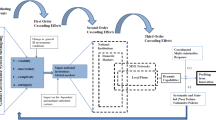Abstract
The process of change from a centrally planned system to a market economy generates an institutional framework that is only partially reformed, and therefore inconsistent and unstable. This leads to high transaction costs for economic agents. Multinational enterprises entering transition countries have to adapt their strategies to the local institutions and reduce exposure to highly imperfect markets. This paper analyzes how the costs of organizing business in transition environments influence entry mode choice. The empirical results show that host country institutions in transition economies, have an impact on the choice of entry modes. Moreover, different mechanisms determine the internalization of managerial and technological knowledge.
Similar content being viewed by others
Author information
Authors and Affiliations
Additional information
*Klaus E. Meyer is Research Professor of International Business with focus on Eastern Europe at the Department for International Economics and Management, Copenhagen Business School, Denmark. His research focuses on direct foreign investment, mergers and acquisitions, and enterprise restructuring in emerging markets, especially Central and Eastern Europe.
Rights and permissions
About this article
Cite this article
Meyer, K. Institutions, Transaction Costs, and Entry Mode Choice in Eastern Europe. J Int Bus Stud 32, 357–367 (2001). https://doi.org/10.1057/palgrave.jibs.8490957
Published:
Issue Date:
DOI: https://doi.org/10.1057/palgrave.jibs.8490957




